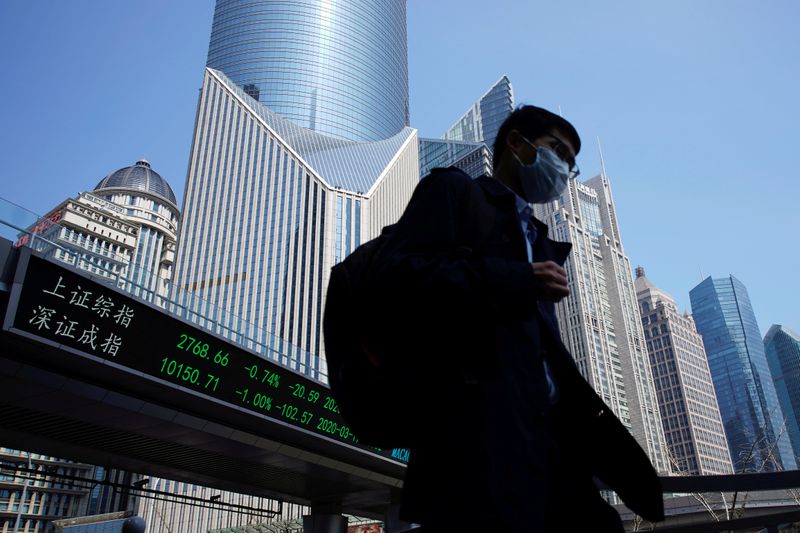By Patturaja Murugaboopathy and Tom Westbrook
(Reuters) - China's equity funds topped Asia in price performance in the first quarter of 2020, Refinitiv Lipper data showed, owing to the resilience of the mainland markets during a coronavirus-induced sell-off in the region.
An analysis of 1,348 Asian mutual funds, which are managed by passive and active fund managers and with net assets of $500 million and more, showed seven out of the top 10 performers in the first quarter of 2020, based on price performance, were from China.
China's GF Small Cap Growth Hybrid Fund (LOF) A
For a related graphic, click https://fingfx.thomsonreuters.com/gfx/mkt/yxmpjxqgprz/Funds'%20performance%20in%20the%20first%20quarter.jpg
Effective containment of the coronavirus outbreak, policy stimulus pledge and the sheer size of the national economy helped Chinese stocks fare better than their global peers, analysts said.
The Shanghai Composite Index (SSEC) fell 9.8% in the first quarter, compared with the MSCI Asia-Pacific index's (MIAP00000PUS) decline of 19.8%.
"When the rest of the world has to react to something, China can afford not to react so much," said Paul Sandhu, head of multi-assets quant solutions at BNP Paribas (PA:BNPP) in Hong Kong.
"They are a massive economy, and their growth is also massive, so in terms of situations like COVID-19... it's not unrealistic for them to have a more tempered response... it's kind of like a nick on a massive aircraft carrier."
Refinitiv Lipper data and a Morningstar analysis also showed fixed income funds exposed to China were solid performers.
A Reuters analysis showed bond funds comprised almost two thirds of the top 20 performing funds in Asia, led by Hong Kong bond funds run by Fidelity Investments and Principal Global Investments, which returned about 5% over the quarter.
Morningstar, which tracked funds available for sale in Singapore and Hong Kong, showed a similar representation.
Fund managers Binay Chandgothia and Raj Singh, who run Principal's HK$6.1 billion ($790 million) Hong Kong bond fund, said a strategy of investing in long-duration Hong Kong and U.S. Treasuries as well as shorter-dated corporate credit paid off.
"We knew this portfolio was ideally positioned with this defensive tilt... to withstand these conditions," said Chandgothia.
They received modest inflows, rather than redemptions over the quarter, which they were able to direct into corporate debt of firms including Alibaba (NYSE:BABA) and Tencent.
"When you do well during these environments, it gives a lot of mental satisfaction... your clients tend to remember you for having done a very good job during very volatile times," said Chandgothia.
On the other hand, Australia's real estate funds, heavily exposed to listed landlords, led the worst performers in Asia.
iShares Australian Listed Property Index
For a related graphic, click https://fingfx.thomsonreuters.com/gfx/mkt/dgkvlylqpbx/Asia's%20worst%20performing%20mutual%20funds%20in%20the%20first%20quarter%20of%202020.jpg
"Most of these REITs, their values are based on passing rents," said Simon Mawhinney, chief investment officer at fund manager Allan Gray.
Falling rents or even vacancies as retail tenants struggle with lockdowns or forced closures would pressure balance sheets of many listed landlords, Mawhinney said.
